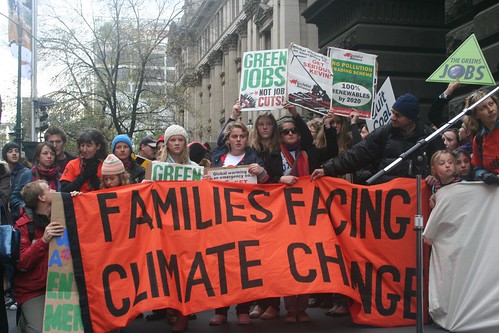
As the world's biggest companies and their friends in
government continue to fight a transition to more just
and sustainable ways of living, climate change
threatens to turn our world upside down with water
shortages, crop failures, sea level rise and ecosystem
collapse. A million species face extinction by the end
of the century, and the people who have contributed
least to the problem will continue to be the hardest
hit. What can be done at this critical juncture, with
our future at stake?
Throughout history, social change has come about when
regular people get fed up with business as usual, get
organized, and take to the streets. If we leave
climate solutions up to politicians and corporations,
then we will lose - not just a political battle, but
the life-support systems of the planet. Time is
running out to avert the worst impacts of climate
change: the time to act is now.
A broad coalition of organizations working for social,
ecological, racial and economic justice has come
together under the banner of the Mobilization for
Climate Justice. Join us as we organize mass action on
climate change on November 30, 2009! November 30 (N30)
is significant both because it immediately precedes the
upcoming UN Climate Conference in Copenhagen and is the
ten-year anniversary of the protests that shut down of
the World Trade Organization meetings in Seattle,
demonstrating the incredible power of collective
action.
Every indication is that any agreement that emerges
from Copenhagen will be nothing more than business as
usual-sacrificing real emissions reductions in favor of
market-based approaches that enhance corporate profits
while delaying a transition away from fossil fuels. The
current approach to climate change in the UN, and in
the US Congress, is based on the creation of a new
market in carbon emissions. Carbon trading (aka "cap
and trade") and carbon offsets do not address the root
causes of global warming, nor do they reduce emissions.
They are designed by and for corporations, and are a
dangerous distraction that should be abandoned.
We urgently need to implement real solutions like
ending excessive consumption, keeping fossil fuels in
the ground, re-localizing production and consumption,
and drastically reducing greenhouse emissions. We must
also protect the rights of workers, displaced peoples,
and others affected by the transition.
In recent months, people of the world have taken
valiant action for climate solutions. On Oct. 24th,
people in 181 countries staged over 5,200 actions
calling for global action on climate change. And on
November 4, African delegates walked out of pre-
Copenhagen negotiations in Barcelona - demanding that
rich countries commit to deeper and faster emissions
cuts - while European activists used civil disobedience
to disrupt the talks.
And now, we're asking you to join us in taking the next
step - a global day of action for climate justice on
Monday, November 30, 2009. Take the day off, get
together with friends, and take a stand for real, just
and effective solutions to the climate crisis!
WHAT YOU CAN DO ON N30:
Several actions are already being planned for November
30 - and many more will be coming soon - so if there's
an action happening in your city or region, we urge you
to join it! See the MCJ site for a map of N30 actions
across the country and across the world.
If there isn't an action being organized in your town,
organize one! If you're already involved in a campaign
against a company that's contributing to climate
injustice, organize an action on against them November
30. You can submit actions by clicking HERE.
If you're organizing an action from scratch, we'd
suggest you go after one of the following companies:
Bank of America, JP Morgan Chase, Morgan Stanley,
Chevron, BP, or American Electric Power. We picked
these six companies because they're all, through their
investments, lobbying, and day to day business, going
out of their way to obstruct real solutions to the
climate crisis.
Wind Energy:
Wind energy is very promising, so is thermal energy, PV, wave ... The only thing that is wrong is that we are not investing enough in any of them. Did you know that if all the declared wind turbines in the world for next year were to be built in China then that would meet only 40% of the expected increase in the demand for electricity on mainland China. This means that China would still need to build in one year the equivalent of 50 coal powered plants each delivering 1000 MW. That is exactly responsible ie it?
Christianity:
Some are blaming Christianity for the recent economic meltdown. The argument is as follows: An increasing number of the "prosperity gospel" school are advancing the argument that success in this life is also to be taken as a sign that God loves us. This leads people to borrow, overconsume and to take risks. Overleveraging and too much risk did not contribute only to the economic meltdown but have played a major role is ecological degradation. So maybe Lynn White was right after all?



